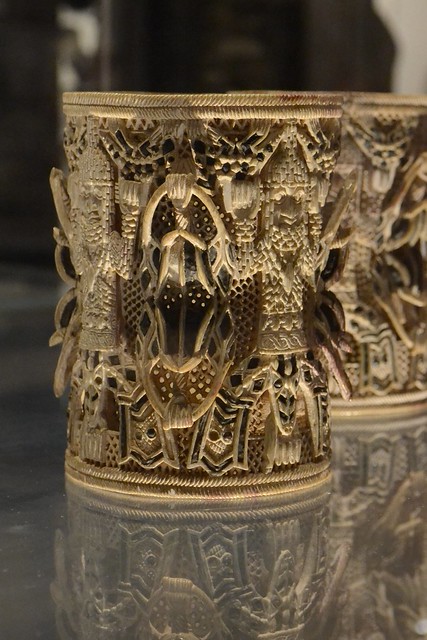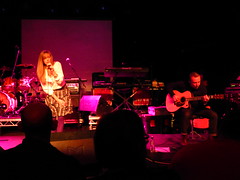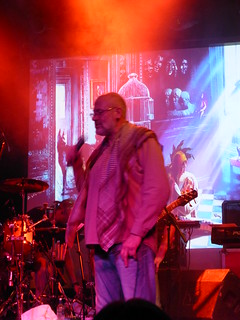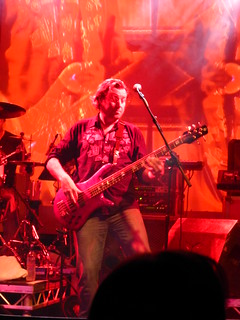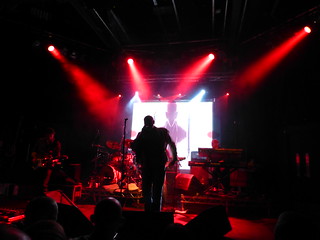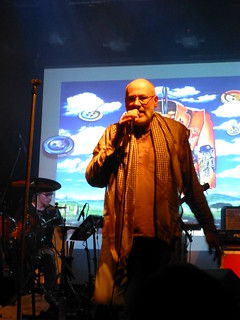The Burrowers: Animals Underground
The second episode of The Burrowers continued with the three main species they were looking at in the artifical burrows – with a main theme of “leaving the nest for the first time”. The rabbit babies had their first trip outside, the water voles got over their dislike of each other & had some babies who then visited the outside, and the badger orphans bonded into a group and took their first trip out.
As well as this they showed us what an actual wild rabbit burrow looks like – by pouring concrete down an abandoned one and then excavating it (which presumably actually happened before they built their artificial one). And Packham also told us about moles. I hadn’t previously realised that moles keep larders of zombie worms. When they catch a worm first they squeeze the dirt out, then they bite the head off and in the process they inject it with their venomous saliva which paralyses the worm. And then they put the still living, paralysed, headless worm in a larder where it stays fresh until they want a meal. o.O
The third episode was set in summer and was mostly wrapping up & talking about what the future holds for the various creatures. The rabbits by this stage had had three litters each – as soon as the female finished giving birth each time the dominant male mated with her. Thus ensuring that all the baby rabbits came out of the nest in waves (presumably there’s some initial way they set up the synchronisation for the first litter) to overwhelm the predators. Only one in ten rabbits normally survives to the age of 1 due to predation, which frankly is just as well given 10 rabbits turned into over 50 in just a few months. They didn’t say on the programme, but that behaviour also means non-dominant males don’t get much of a window of opportunity to impregnate the females. Most of these rabbits were apparently going back to the breeders, but some were staying for future study.
The water voles managed to have another litter as well – almost despite themselves as the breeding pair still didn’t seem to get along peacefully. They’re all being released into the wild in Scotland somewhere as part of a regeneration programme. And the badgers are also being released into the wild. They actually moved out of the pre-prepared sett and started digging their own in their enclosure. The researchers had been testing their response to badger calls by playing sounds in their sett, and they’d provided extra bedding while the badgers were away. So I reckon the badgers moved out coz they thought the old sett was haunted 😉 Noises in the darkness where there were no badgers, randomly appearing plants in rooms you didn’t leave anything in … who’d want to live somewhere like that? 😉
A fun series, although to be honest not much of note beyond “aww, look at the cute fluffy animals”.
Mothers, Murderers and Mistresses: Empresses of Ancient Rome
The last episode of Catharine Edward’s series about powerful Roman women covered more ground & more women than the first two. The themes linking them together (other than “these are the rest of them”) were that these women were generally outsiders to the aristocratic Roman culture that the women of the first two episodes came from, and they mostly wielded their power more overtly. Edwards started by telling us about Caenis, who had been a slave to a member of the Imperial family (Antonia, mother of Claudius). Caenis had had an affair with Vespasian long before he was Emperor (and when she was still a slave). She was given her freedom, and after Vespasian’s wife died the two resumed their relationship – however her low social status meant that he could not marry her. Once he became Emperor she continued to live as his wife in all but name, and exerted quite a lot of influence over him including some degree of control over access to him. Next up was Berenice who provides an object lesson in how Roman Emperors weren’t as all powerful as they might hope. The Emperor Titus (son of Vespasian) had formed a relationship with the Jewish Queen, Berenice, while he father was still alive. Once he became Emperor he was forced to bow to public pressure & to set her aside – she was too old (i.e. past child-bearing age) and too foreign.
The next three women were all foreigners, and all related. The wife of the Emperor Septimus Severus was a Syrian woman called Julia Domna. She wielded power alongside her husband much more openly than previous Empresses, and was popular & respected when doing so. After Septimus’s death their son’s inherited jointly, which ended badly as one might imagine. Despite never forgiving her older son for murdering his younger brother she still helped to run the empire, and was grief-stricken at his death (although mostly because she wouldn’t have power any more after that). The next two Emperors were both put on the throne by female relatives of Julia Domna. Sadly the first of these teenage boys was utterly useless as Emperor, and despite the best efforts of his mother Julia Soaemias to rule through him he was overthrown by his aunt Julia Avita and her son Alexander. Alexander might’ve made it as a decent Emperor, but his mother forgot the cardinal rule of keeping the army onside and got stingy with their pay – with the obvious result.
Last of the powerful Roman women was Helena, who can’t really be missed out – mother of Constantine and discoverer of the True Cross (amongst other pious things). Edwards credited her as a major influence on Constantine’s move towards Christianity, and of his changing imperial policy to make the Empire Christian.
A good series, Edwards managed to make it both informative & fun. We did at times wonder how the Roman Empire had got anything done or lasted as long as it did – so many of the Emperors seemed useless or overly concerned with their own debaucheries at the expense of the Empire.
King Alfred & the Anglo-Saxons
The second episode of Michael Wood’s series about the Anglo-Saxons was mostly about Æthelflæd, the daughter of Alfred the Great. Alfred was succeeded by his son Edward in Wessex, and his daughter Æthelflæd was married to the King of the Mercians. The main political crisis of the time was caused by Alfred naming Edward his heir. Alfred had succeeded his elder brother and re-taken Wessex from the Viking’s who’d killed his brother. His nephew Æthelwold had in many ways a better claim to the throne than Edward, but was cut out of the succession by Alfred. So once Alfred died Æthelwold rose up in rebellion, with the help of the Vikings who still ruled East Anglia & Northumbria. He was eventually beaten back by an alliance of Wessex & Mercia led by Edward & Æthelflæd.
Æthelflæd is known as the Lady of the Mercians, and after her husband’s death she ruled on her own. Unusually for the time there is documentary evidence for her power & rule – the “official” record of the Anglo-Saxon Chronicle doesn’t refer to her much, but there is a chronicle written detailing the same events from her perspective (in the sense of she’s the main figure of the chronicle not in the sense of a first person account). She is recorded as acting as a King – she leads armies, she plans military campaigns, she acts as a diplomat. Wood tells us that without Æthelflæd & her leadership of Mercia there would not have been England as we know it. Æthelflæd was even succeeded by her daughter, the only time this has happened in English history, but she was removed from power by her uncle (King Edward of Wessex) and he ruled Mercia as King of the Anglo-Saxons.
The Story of the Jews
The third episode of Simon Schama’s series The Story of the Jews covered the promise of integration of the early Englightenment, and the subsequent dashing of those hopes with the rise of a particularly anti-Semitic form of nationalism. At the start of the Enlightenment a spirit of toleration was growing – that put forward the idea that a Jew could be a person who just happened to follow the Judaic religion and should be treated like any other person. Many Jewish families in Germany & France began to integrate into the culture of the country they lived in, becoming members of society & even notable members of high society. Moses Mendelssohn was one of the first examples of this. Although some of his descendants (like Felix Mendelssohn the composer) were baptised, other families like the Beer family remained true to their Jewish religion & heritage. One of the prominent members of the Beer family was Giacomo Meyerbeer (who started life in Berlin as Jacob Beer, changing his name when he moved to Italy) who was a very popular composer of operas in Paris. He was an early patron of Wagner’s – encouraging him and providing him with opportunities to stage his own operas. Schama had other examples, including banking families & others – the common thread was that they generally thought of themselves as German or French or whatever people who happened to be Jewish, rather than Jews who happened to be living in whatever country it might be.
Sadly this promising mood of integration & an end to prejudice against the Jews didn’t last. Wagner as mentioned above might’ve had a Jewish patron initially, but he published anti-Semitic rants against Meyerbeer late. He took the stance that “true art” had much to do with nationalism and roots in a country and that Jews by definition could not be a part of that and so could not produce any real art – which frankly is wrong on so many levels it’s hard to know where to start to shake one’s head at it. This nationalistic stance was common in the late 19th Century, and incidents like the disgrace of Alfred Dreyfus, a French Jew in the French Army, for allegedly passing state secrets to the Germans hardened this anti-Semitism. The propaganda was that Jews could only be loyal to each other first, and their “adopted” countries second … along with the usual collection of prejudices dating back medieval times. And the rising anti-Semitism lead to a change in Jewish attitudes too and the rise of Zionism. Instead of integration into other countries & cultures many Jews now wanted their own country where they were already the culture.
The programme ended where one would expect – with the rise of the Nazis in Germany, as the extreme towards which that anti-Semitic strain of nationalism was tending. A sombre end to a period which had begun with such hope.
